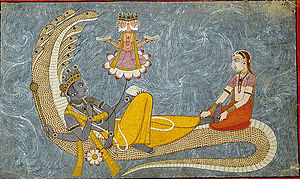Garbhodakaśāyī Vishnu is an expansion of Mahavishnu. In Gaudīya Vaishnavism, the Sātvata-tantra describes three different forms of Vishnu as: Mahāvishnu, Garbhodakaśāyī Vishnu and Ksirodakaśāyī Vishnu (Paramātmā). Each form has a different role in the maintenance of the Universe and its inhabitants.

The commentary on the Bhagavad Gita describes this form of Vishnu:[1]
For material creation, Krishna's plenary expansion assumes three Vishnus. The first, Mahā Viṣhṇu, creates the total material energy, known as the mahat-tattva. The second, Garbhodakaśāyī Viṣṇu, enters into all the universes to create diversities and the third, Kṣīrodakaśāyī Vishnu, is diffused as the all-pervading super soul in all the universes; in the heart of every living being, is known as Paramātmā. He is present even within the atoms.The goal of life is to know Kṛṣṇa, who is situated within the heart of every living being as Paramātmā, the four-handed Viṣṇu form.
— Commentary, Bhagavad Gita, Chapter 7
In Srimad Bhagavatam, this is explained as: Karanodakashayi Vishnu is the first incarnation of the Supreme Lord, and He is the master of eternal time, space, cause and effects, mind, the elements, the material ego, the modes of nature, the senses, the universal form of the Lord, Garbhodakaśāyī Viṣṇu, and the sum total of all living beings, both moving and non-moving. [2]
Garbhodhakaśāyī Vishnu is an expansion or overload of Mahavishnu (expansion of Saṃkarṣaṇa of second caturvyūha, which expands from Nārāyaṇa in Vaikuṇṭhaloka). Garbhodhakaśāyī Vishnu is realized as the form of Pradyumna within the material universe. He is the father of Brahmā who appeared from His navel and hence Garbhodakashayi Vishnu is also called Hiraņyagarbha.
See also
editReferences
edit- ^ https://vedabase.io/en/library/bg/6/advanced-view/.
{{cite web}}: Missing or empty|title=(help) - ^ "ŚB 2.6.42". vedabase.io. Retrieved 3 November 2020.
External links
edit- That Lord Śrī Kṛṣṇa, by His plenary parts, should be rendered devotional service
- Thousand names of the Supreme (Vishnu Sahasranama Stotram)